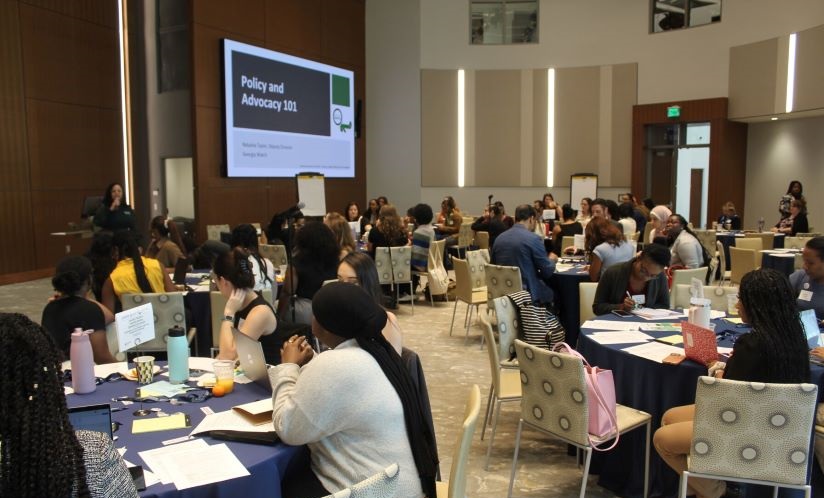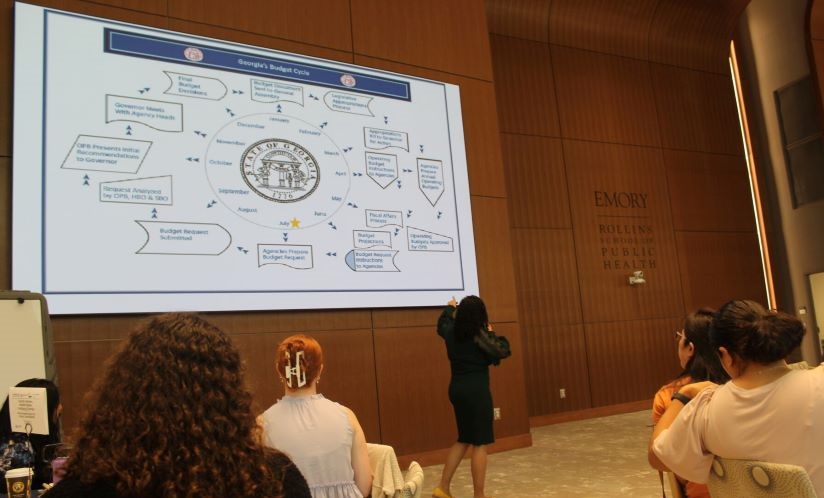From Public Health to Public Policy: Workshop Teaches Students How to Advocate for Maternal Health and More

Georgia Watch Deputy Director Natasha Taylor delivers a policy and advocacy 101 training. Photo credit: Amanda Glover, Communications Specialist, Healthy Mothers Healthy Babies Coalition of Georgia
“You all in this room are already experts. You all have lived experiences. You work with community members experiencing things on a daily basis. You already know what you need to know for your policy pitch.” That was Georgia Watch Deputy Director Natasha Taylor’s message to public health students as she kicked off the inaugural Maternal and Child Health Policy Workshop at the Rollins School of Public Health.
The workshop took place September 22, 2023, and was a joint initiative from:
- The Rollins School of Public Health Maternal and Child Health Center of Excellence
- Morehouse School of Medicine Center for Maternal Health Equity
- Healthy Mothers Healthy Babies Coalition of Georgia (HMHBGA)
- Georgia Watch
During the workshop, approximately 100 students from Rollins and Morehouse got to engage with Georgia Watch's advocacy training, hear from Georgia maternal and child health organizations about their policy priorities, and work with leaders to develop a policy pitch.
Georgia State Sen. Randy Robertson (District 29), Rep. Lauren Daniel (District 117), and Rep. Yasmin Neal (District 79) were also in attendance to support the maternal and child health work as well as help give students feedback on their policy pitches.
Georgia State Sen. Randy Robertson, Rep. Lauren Daniel, and Rep. Yasmin Neal listen and provide feedback to students' policy pitches. Photo credit: Theo Gayle, Rollins.
Georgia Watch developed this workshop to “help people get comfortable with approaching their lawmakers,” said Taylor. When it comes to influencing policymakers, you have to be able to “grab them in two to three minutes with key points; that is how you can get change done.”
Advocating for Maternal and Child Health
And when it comes to maternal health, workshop leaders stressed the need for change now. “Many of us have been working for decades in health equity and in reproductive justice in the South and southeast but feel this is a particular moment in time,” said Michael Kramer, PhD, associate professor of epidemiology at Rollins.
“Many of us have a sense of urgency because we look at the state of Georgia and it ranks among the worst in maternal mortality and infant mortality. About half of the state's counties don’t have an OB…but we have opportunity and hope, and that is in you all—this generation of maternal health leaders,” Kramer told the students at the workshop. “This generation has a new imagination for how we can create a world in Georgia that is more equitable.”
When thinking about maternal and child health policy advocacy, the executive director of the Morehouse School of Medicine’s Center for Maternal Health Equity, Natalie Hernandez, PhD, told students: “maternal health is a nonpartisan issue.”

Key Takeaways About Advocacy for All Public Health Students
Georgia Watch’s Taylor took students through a policy and advocacy 101 training, covering all the ins and outs of advocacy, getting involved, and how a bill becomes a law in Georgia.
These are three of Taylor’s top tips for how to effectively advocate for policy change:
- Know and use the facts.
- Keep your message simple.
- Make your voice heard by engaging others.
Taylor also asked students why they want to learn to advocate for policy change. Answers in the room ranged from “I want to be a future legislator” to “I want to help create change.”
Here are some of the reasons Taylor shared as to why it is important to advocate for policy change:
- You can change the lens through which issues are viewed.
- Your voice and perspective will be heard, helping to level the playing field.
- Legislators cannot be experts in everything, and they want to understand the people they represent.